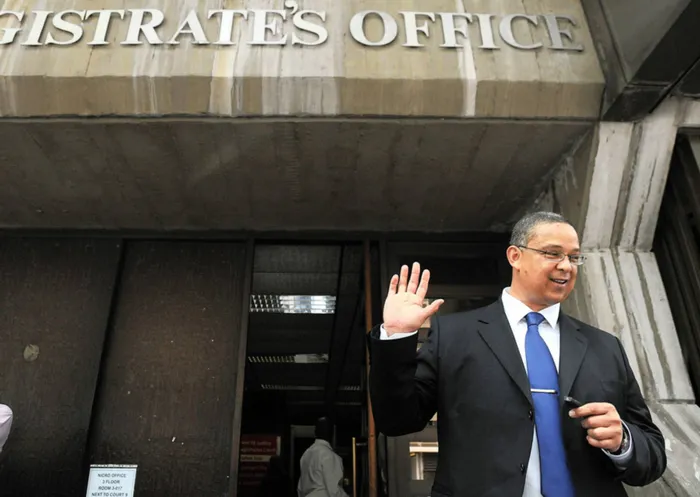I had no alcohol - McBride

All witnesses in the drunken driving trial of former Ekurhuleni metro police chief Robert McBride concluded testifying in the Pretoria Magistrate's Court. Photo: Phill Magakoe, Pretorria News All witnesses in the drunken driving trial of former Ekurhuleni metro police chief Robert McBride concluded testifying in the Pretoria Magistrate's Court. Photo: Phill Magakoe, Pretorria News
“I had no alcohol,” Robert McBride told the Pretoria Regional Court yesterday. The former Ekurhuleni metro police chief took the stand after the State closed its case, saying he did not drink on December 21, 2006 when he crashed his car on the R511 near Hartbeespoort Dam.
McBride attributed the incident to his diabetes, saying the dosage of the medication had changed the day before the incident.
He remembered not feeling well at the “unofficial” work function and asked someone to bring him food. The next he remembered was being in a car, lying on the reclined passenger seat with former colleague Stanley Sagathevan driving.
Facing charges of fraud, defeating the ends of justice and drunken driving, he said he had been diagnosed with diabetes in 2000.
Dr Inbanathan Sagathevan, Stanley’s cousin, had been treating him for it since 2005.
Stanley Sagathevan, Patrick Johnson and Itumeleng Kok were employed by the Ekurhuleni metro police. It is claimed that they were investigated for alleged criminal activities, including the attempted murder of alleged cash-in-transit heist kingpin Marco Singh.
This trio initially gave statements that McBride was not drunk at the time of the crash, but after receiving immunity for these charges, they made further statements saying their boss had been under the influence.
McBride said yesterday that he went to Dr Sagathevan on December 19, 2006. The doctor increased his dosage from 2mg to 3mg. This could lead to increased production of insulin in the body. He took the first of this new dose on December 20 that year. Later that day, he blacked out at a stop street. Thinking it was due to exhaustion, McBride said, he asked Stanley to assist him driving.
On the day of the accident he arrived at the function after 5pm. “I played a bit of soccer and spoke to the officers. I felt exhausted and indicated to one of the officers that I did not feel well. The next I recall was in the car with Stanley,” McBride said.
He added: “I had no alcohol.”
Feeling blood in the region of his neck and head, McBride said, Stanley took him to his cousin.
Dr Sagathevan was in a hurry as his wife was in labour. He quickly checked McBride before writing notes, saying Stanley should give them to McBride’s wife to check him, the accused testified. Later that same night his wife woke him, insisting that he go to a doctor.
McBride said he went to his friend Dr Gomolemo Mokae in Ga-Rankuwa. As this doctor was not practising any more, he referred McBride to Dr Joseph Morolong Moratioa.
He said this doctor tested his blood sugar level, saying it was “dangerously low”.
On December 27, 2006 he still experienced pain and went to hospital, where it was indicated that he had suffered concussion. As he was off sick until the end of December, McBride said, he asked Stanley to make an appointment for him to be examined by a doctor so that he could obtain a sick note for the time he was away from work.
However, they could not get hold of Dr Moratioa for the rest of December. McBride denied ever telling Stanley to get a sick note without his being examined.
During cross-examination State advocate Christo Roberts asked why the accused, who stayed in Water-kloof, first went to Dr Sagathevan in Boksburg, and then to doctors in Ga-Rankuwa.
McBride said he didn’t want to appear in public with blood on him and being disorientated and confused. He was also embarrassed by his diabetes, adding he was “slipping in and out of consciousness”.
“Two days after I had been to the hospital, my medical records were given to a newspaper,” he said. - Pretoria News